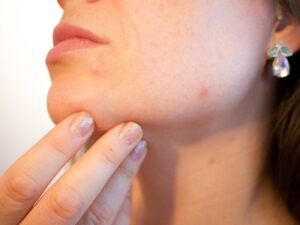Breakouts are bound to happen, but it’s possible that you’ve noticed more unwanted friends popping up on your chin and cheeks where your mask sits. Could your mask be causing these unwanted breakouts? Yes!
Dr. Mary Dickerson of Louisiana Dermatology Associates explains, “Maskne is definitely a real thing I see many times a day. It is acne caused or flared up by wearing a mask. Before the recent pandemic, it wasn’t a common thing, but now that masks are mandatory in many places, maskne is on the rise.”
Dr. Dickerson shares that maskne is “most likely caused by moisture from your own breath and friction and occlusion from the mask causing irritation, inflammation and plugging of the follicles and pores on the face.”
With maskne being a real thing, knowing how to deal with it is another. Dr. Dickerson offers the following tips to help prevent those pesky breakouts.
Wash Your Face
The first line of defense is to keep up with washing your face. “Continue to wash your face twice a day with a non-irritating cleanser. I really like Cerave Hydrating Cleanser for dry, irritated skin and Cerave Foaming Face Wash for more normal to oily skin,” says Dr. Dickerson.
Makeup Tips & Acne Treatment Tricks
Dr. Dickerson recommends to “try not to put makeup or irritating products on under your mask. Save acne treatments like retinoids for the evening when you are not wearing a mask. Wear a light, non comedogenic moisturizer in the morning over your entire face, preferably one with SPF to protect you from the sun while you’re driving. Cerave AM is a nice daily moisturizer.”
Wash Your Mask
Masks can get gross, especially with how often we are wearing them! “Make sure to wear a clean or new mask daily. Give your face mask breaks during the day if you have an opportunity,” says Dr. Dickerson.
Try an Acne Cream
If you’re running into more issues, reach out to your dermatologist. Dr. Dickerson says, “If you are having trouble and need to start an acne cream, apply a thin layer over the entire area at night. Spot treating won’t prevent future breakouts. Masks may be with us for a while, so stick to a good routine and see a Board Certified Dermatologist if you need help.”





